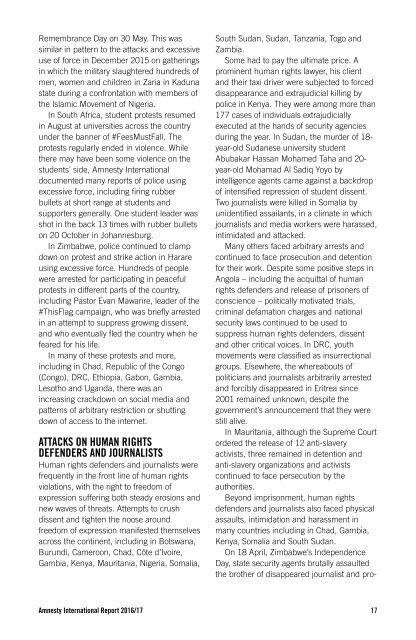AMNESTY INTERNATIONAL REPORT 2016/17
2lEHU9j
2lEHU9j
You also want an ePaper? Increase the reach of your titles
YUMPU automatically turns print PDFs into web optimized ePapers that Google loves.
Remembrance Day on 30 May. This was<br />
similar in pattern to the attacks and excessive<br />
use of force in December 2015 on gatherings<br />
in which the military slaughtered hundreds of<br />
men, women and children in Zaria in Kaduna<br />
state during a confrontation with members of<br />
the Islamic Movement of Nigeria.<br />
In South Africa, student protests resumed<br />
in August at universities across the country<br />
under the banner of #FeesMustFall. The<br />
protests regularly ended in violence. While<br />
there may have been some violence on the<br />
students’ side, Amnesty International<br />
documented many reports of police using<br />
excessive force, including firing rubber<br />
bullets at short range at students and<br />
supporters generally. One student leader was<br />
shot in the back 13 times with rubber bullets<br />
on 20 October in Johannesburg.<br />
In Zimbabwe, police continued to clamp<br />
down on protest and strike action in Harare<br />
using excessive force. Hundreds of people<br />
were arrested for participating in peaceful<br />
protests in different parts of the country,<br />
including Pastor Evan Mawarire, leader of the<br />
#ThisFlag campaign, who was briefly arrested<br />
in an attempt to suppress growing dissent,<br />
and who eventually fled the country when he<br />
feared for his life.<br />
In many of these protests and more,<br />
including in Chad, Republic of the Congo<br />
(Congo), DRC, Ethiopia, Gabon, Gambia,<br />
Lesotho and Uganda, there was an<br />
increasing crackdown on social media and<br />
patterns of arbitrary restriction or shutting<br />
down of access to the internet.<br />
ATTACKS ON HUMAN RIGHTS<br />
DEFENDERS AND JOURNALISTS<br />
Human rights defenders and journalists were<br />
frequently in the front line of human rights<br />
violations, with the right to freedom of<br />
expression suffering both steady erosions and<br />
new waves of threats. Attempts to crush<br />
dissent and tighten the noose around<br />
freedom of expression manifested themselves<br />
across the continent, including in Botswana,<br />
Burundi, Cameroon, Chad, Côte d’Ivoire,<br />
Gambia, Kenya, Mauritania, Nigeria, Somalia,<br />
South Sudan, Sudan, Tanzania, Togo and<br />
Zambia.<br />
Some had to pay the ultimate price. A<br />
prominent human rights lawyer, his client<br />
and their taxi driver were subjected to forced<br />
disappearance and extrajudicial killing by<br />
police in Kenya. They were among more than<br />
<strong>17</strong>7 cases of individuals extrajudicially<br />
executed at the hands of security agencies<br />
during the year. In Sudan, the murder of 18-<br />
year-old Sudanese university student<br />
Abubakar Hassan Mohamed Taha and 20-<br />
year-old Mohamad Al Sadiq Yoyo by<br />
intelligence agents came against a backdrop<br />
of intensified repression of student dissent.<br />
Two journalists were killed in Somalia by<br />
unidentified assailants, in a climate in which<br />
journalists and media workers were harassed,<br />
intimidated and attacked.<br />
Many others faced arbitrary arrests and<br />
continued to face prosecution and detention<br />
for their work. Despite some positive steps in<br />
Angola – including the acquittal of human<br />
rights defenders and release of prisoners of<br />
conscience – politically motivated trials,<br />
criminal defamation charges and national<br />
security laws continued to be used to<br />
suppress human rights defenders, dissent<br />
and other critical voices. In DRC, youth<br />
movements were classified as insurrectional<br />
groups. Elsewhere, the whereabouts of<br />
politicians and journalists arbitrarily arrested<br />
and forcibly disappeared in Eritrea since<br />
2001 remained unknown, despite the<br />
government’s announcement that they were<br />
still alive.<br />
In Mauritania, although the Supreme Court<br />
ordered the release of 12 anti-slavery<br />
activists, three remained in detention and<br />
anti-slavery organizations and activists<br />
continued to face persecution by the<br />
authorities.<br />
Beyond imprisonment, human rights<br />
defenders and journalists also faced physical<br />
assaults, intimidation and harassment in<br />
many countries including in Chad, Gambia,<br />
Kenya, Somalia and South Sudan.<br />
On 18 April, Zimbabwe’s Independence<br />
Day, state security agents brutally assaulted<br />
the brother of disappeared journalist and pro-<br />
Amnesty International Report <strong>2016</strong>/<strong>17</strong> <strong>17</strong>


